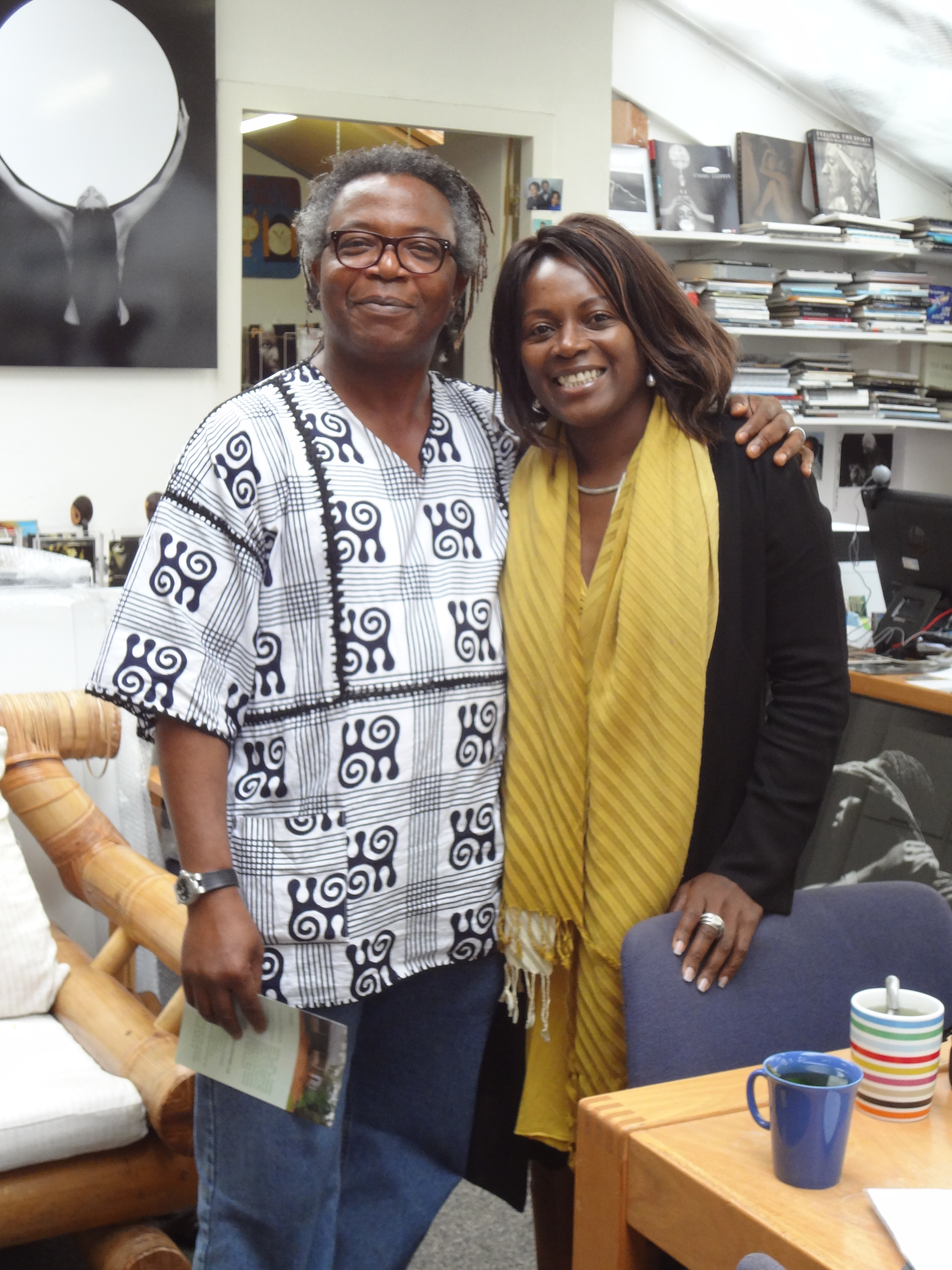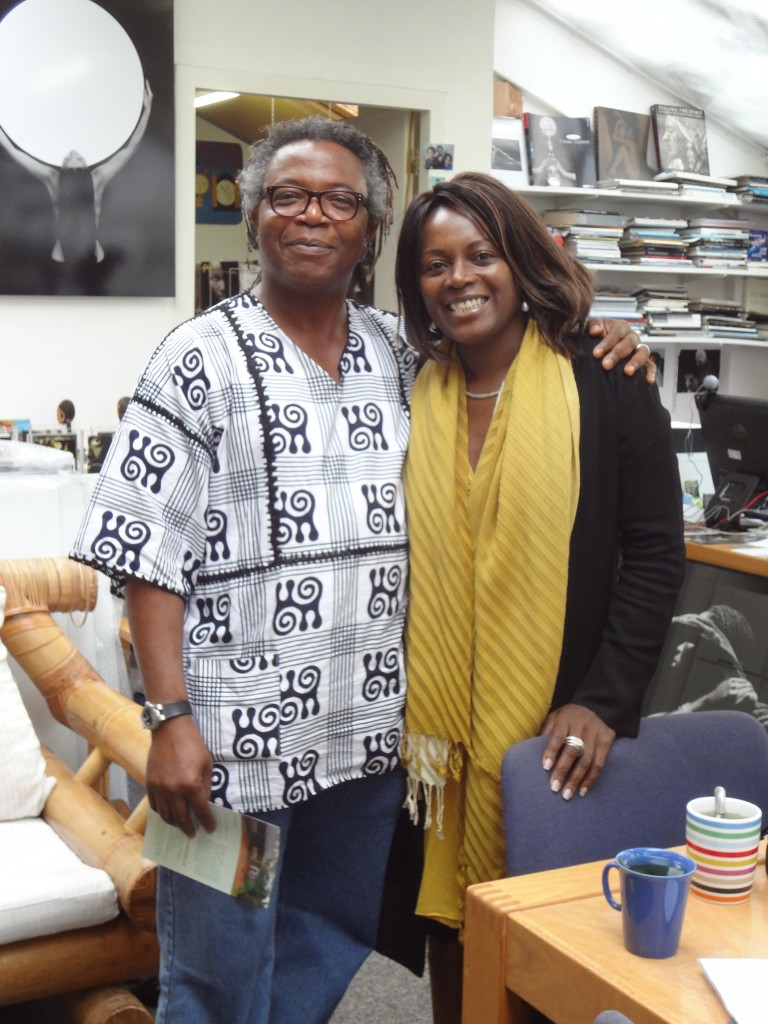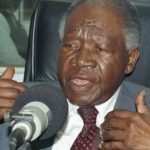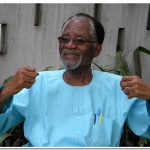Interview with Angèle Etoundi Essamba
Posted by By Akogun Akomolafe at 8 August, at 09 : 42 AM Print

Warning: count(): Parameter must be an array or an object that implements Countable in /home/alaye/public_html/wp-content/themes/Video/single_blog.php on line 56
(published in the New African magazine, Aug-Sept, 2013 issue, pp84-87)
With over two hundred exhibitions in more than 100 countries, and more than 50 publications in High-End Journals/Magazines, ANGÈLE ETOUNDI ESSAMBA is undoubtedly one of the most-accomplished woman photographer plying her trade today.
Born in Cameroon, Angèle Etoundi Essamba moved to Paris at an early age. After her high school education in the French capital, she moved to the Netherlands where she trained as a Fine Art Photographer at the famous Dutch Professional School of photography in ….
Her first exhibition was at the Maison Descartes in Amsterdam in 1985.
From there, her professional ascendancy has been on an upward trajectory.
Today, she works as a Fine Art Photographer and Consultant in Visual Communication from her quiet and well-appointed studio in the commercial capital of the Netherlands.
Angèle’s works have been exhibited in museums, institutions, art fairs and galleries in Africa, Europe, the United States, Latin America, the Arab Emirates and Asia.
Her elegant, stunningly vibrant and evocative photographs have graced many billboards across the world, and they have been published in numerous publications that includes: Passion 1989, Contrasts 1995, Symboles 1999, Noirs 2001, La Métamorphose du sublime 2003, Dialogue 2006, Voiles & Dévoilements 2008, Africa rising 2010, I– dentity – Eye-dentity 2010, As it is 2010, Africa see you, see me 2011, Desvelos 2011, Black & Red beyond color 2012.
Her photographs also form part of several public and private collections.
Women unmistakably constitute the main theme of Angèle artistic expressions, with special bias towards strong black women.
Angèle Etoundi Essamba varied background and various travels and exhibitions have undoubtedly shaped her professional works.
Her models boldly challenge the stereotypical representation of women (especially African women) as weaklings – mere ornaments to decorate their menfolk; or weaklings waiting for Western miracle workers.
Angèle’s women are portrayed as strong, autonomous individuals exuding supreme confidence. Unlike those that seek to project their own society’s notions of beauty, Angèle’s model are as elegant as they are beautiful, and no one can mistaken them for anything but proud African women. They come out as assertive, independent beings with minds and goals of their own.
Her photographs are not only strongly expressive, but they portray all the possibilities of a humanistic world of solidarity and equality. All of Angèle’s works remain unapologetically Pan-African in their cultural awareness/integrity.
Angèle’s keen social awareness led her to establish the Foundation Essamba Home in 2009. Through the foundation, she is helping to mentor street girls in Cameroon and give them a sense of self-worth and self-esteem.
She is personally involved in coaching the girls, and she gives workshops to impart skills through which the indigent girls can improve their living conditions.
Angèle has also been involved in similar creative training of young women in South Africa (Townships in Johannesburg) and in Colombia (Afro- Colombian community in Quibdó).
She obviously draws inspiration from her African roots and uses her photography to communicate her messages in a creative way.
Besides exhibitions of her work, Angèle has also joined various organizations, institutions and NGO’s to contribute as a resource person, workshop animator or guest speaker to devise ideas and methods to strengthen capacities.
She has also cooperated with UN-Agencies, Art schools, Universities, Ministries and Developments, Embassies, Cultural Institutions, Art galleries and Museums on various Art related projects.
Femi Akomolafe interviewed her at her studio in Amsterdam, the Netherlands.
1 Shall we begin by asking you to introduce yourself; who is Angèle Etoundi-Essamba?
Ans: I am Angele Etoundi-Essamba. I was born in Cameroon. My mother is from the commercial capital, Douala, and my father is from the capital, Yaoundé.
I actually grew up in my grandfather’s big compound house in Yaoundé.
My recollections were that of living in a very big, extended family of uncles, aunties, nieces, brothers, cousins, sisters with everyone living in complete harmony devoid of strive.
Grandfather was a well-respected Patriarch who looked after the entire family. No one dare to fight in the presence of grandfather.
My memory of grandfather was that of a strict, very disciplined person; but he was always fair.
I still recollect those days with huge fondness. It was a life of no-worries as grandfather was always there to take care of things.
My father moved to France when I was quite young, and I was the first of his children to join in.
What I quite remember was that I dressed up in a flamboyant Pink dress with a wicked red shoes.
I was so excited as the whole family brought me to the airport. But I ended up crying all the way to Paris because as soon as the plane left the ground I started to miss my home and family. My initial excitement soon turned into one of great fear of abandonment as all I saw around me were strange faces.
You must remember that I was then not even ten years old, and I felt so lonely. I arrived in Paris with a face full of dried tears. My father’s presence at the airport helped somewhat as I was glad to see a familiar face.
What I remember from my early days in France was the bitter cold. I arrived in January 1972 when the country experienced a biting winter. Also no one had prepared me psychologically for what to expect in a strange land.
I spent my early years in the French capital, Paris. It was there I had my education before I moved to the Netherlands in 1982.
I was not to see Cameroon again until after nineteen years of exile – self-chosen, I must add.
2 You trained at the Dutch Professional School of photography, why did you find photography fascinating?
Ans: For a start, human things have always fascinate me. Also, I believe that my longing for identity, my African identity, after so many years of not seeing my homeland and its familiar surroundings, greatly influenced my choice. I needed to find an outlet, an avenue to express my longings. Besides, I have always been fascinated by images and the need to capture things in space and time.
As a child I used to wonder a lot about things, and the need to express these wonderments find expression in my photographs. There is also the need to immortalize moments, people, feelings, emotions.
I would say that photography chose me rather than the other way. Or we both chose each other.
I have always have this yearning to capture and share something. Photography brings people to see another view; it drives people to think.
3 What can you tell us about your professional life?
Ans: I started out in 1985 with my first exhibitions. As a professional Artist-Photographer, people need to see your works otherwise there is no point in your taking photographs.
But I will tell, it is hard work that involves lots of travelling and preparations.
Apart from exhibitions, I also spend time in organizing training. I give a lot of lectures, at workshops as I am very passionate about giving something back, imparting knowledge.
I like to work a lot with disadvantaged people, mainly women and students. The aim is to let people realize that with commitment, they also can realize their potentials.
The message I try to impart is that it possible to do things that are seemingly impossible. If I, a black woman, can do it, so can you.
All that is require is the will, the self-confidence and the passion.
I also try to tell people that we are all students – we are all still learning.
With other forms of art like painting, you need to learn, but photograph is easier because you already have your main tool, the camera. The only thing you need to do is develop the way you look at things and you capture the essence in it.
And now digital cameras have even simplified things further; it is now easy to make wonderful pictures.
4 Your CV says that the keywords to your work are “pride, strength and awareness, “can you explain?
Ans: My whole work is about breaking down the stereotypes of African woman of famine, oppression, weak, dependent, misery, exoticism and passivity.
That was not the African woman that I know. The African woman I know is strong with inner and outer strength that is impossible to define.
I try, through my photographs, to captures the essence of the African woman in the gestures, the look, the sheer elegance and also their emotions.
Actually I see my work as mostly self-portrait. What I portray in my works is what I see, perceive and feel. It is me.
5 Looking at your CV, you have been practically all over the world, do you remember to how many countries you have been?
Ans: Ah, I have been to all the continents save for Australia.
6 And which is your favourite country and why?
Honestly, I do not have a favourite one as every country has its own uniqueness. Each country I have visited has its own special place in my heart.
7 Who are some of the most important people you have met?
Ans: I have met so many amazing people all over the place. I do not talk about the famous or the celebrity types; but ordinary human beings doing ordinary human things. People I have learned from and who tremendously enriched me
It is incredible how people can inspire you.
Wherever I go, I try to relate to the local people. They show me the local flair and from them I get the most inspirations for my works.
I also try to maintain contact with the people I meet on my travels.
8 Since your first exhibition at the Maison Descartes Amsterdam in January 1985, do you remember how many exhibition you have held?
Ans: ….
9 Can you tell us what a typical day in your studio is like?
Ans: Oh My God! There is always so much to do here especially when there is an exhibition to be done.
You won’t believe the amount of work we have to put into each exhibition – research, writing the concept, submitting proposals, follow-up, organizing the logistics, more follow up.
You have to be involved in the all the minutiae’s. It is almost like a military campaign; you cannot leave anything to chance.
People also come to the studio and you have to meet, show them around explain your work to them and sell to them.
Of course, there are always the paperwork that consume loads of your time.
10 From where did you get your inspiration?
Ans: Ah! Inspiration comes from the most unlikely places. I would say, however, that mine comes mainly come from my own life. I draw inspirations from my dreams, my aspirations. I get them from how I see things, and I how imagine the world to be.
I get lots of inspiration from my own experience.
What I make in my photography is a reflection of my own life as a Black woman in a white world.
People also inspire me. In Tanzania and Zambia for example, I didn’t set out to photograph, but suddenly from my interactions with women, I got huge inspirations.
The same thing happened in Benin. I went there and saw all these beautiful and amazing women make their living on water. I was instantly wowed and that gave me the inspiration for my current project.
But above all, I think that my self-imposed exile has greatly influenced and inspired me.
11 Thematically, you choose women in most of your photographs, is there a reason for this?
Ans: Of course. Women deserve to be celebrated. Women are the carriers and transmitters of life.
As I mentioned earlier, my works are mostly self-portrait. I wanted to create my own identity; show the woman I AM and how proud I am to be who I am
The question of who I am in this world has been one that always agitate my mind.
12 Most of your works have Pan-African tints, is that deliberate?
Yes, it is very deliberate. I tried, through my works, to create my own consciousness. The type of Black women that I see portrayed in the media in the western world do not reflect the Black women that I know and to which I can relate.
African women are neither weak nor passive, au contraire!
African women are not only beautiful, they are strong, elegant and very graceful.
Actually this is not difficult to do since it requires no distortion. You cannot show strength where it does not exist.
I try to portray African women as realistically as possible. The outcome are the photographs you see of proud, self-assured women in their natural state.
Of course, you do a little choreography here and there, but the women I photograph are genuine articles who are just being themselves.
13 The art world is very competitive; how do you survive, especially in this bad economic times?
It is not easy but we get by. You must remember that apart from exhibiting my works, I give lectures and I organise workshops. I consult on communication arts as well.
I supplement also by working with organisation that seek to empower women.
Many organisations like the way women are empowered in my works, they approach me and we collaborate.
What is important however is the passion one has for what one does. I don’t set out looking for commercial successes for the type of projects I undertake.
The most important thing is intense love to immortalize images you like. It is equally important to share with people.
14 You are a very big name in the European art scene, do you also have some projects in Africa?
Ans: Yes, yes. Actually my next big project is on women and water in Benin Republic.
I am interested in the issue of art and development, so I’m seriously exploring how art can complement development in Africa.
The project will commence fully in September this year. The Photo-book will be ready by the end of this year, and the Travelling Exhibition will start in 2014.
15 You were involved in training your girls in Cameroon, South Africa and Colombia, can you tell us more about what the training was about?
Ans: It is part of the efforts to give something back to society; to share ideas and knowledge
It is also to empower the girls and mentor them so that they can realize their full potentials. I organise workshops for them on photography. There I teach them to how create their own identity through their photographic works.
We also have the Camera Projects where we get companies to donate the older models of their cameras that we give to the girls.
Olympus Netherlands has thankfully supported twice us.
We give the cameras to the girls and teach them how to make not take photographs.
16 You set up a Foundation, the Foundation Essamba Home, what are the objectives of the foundation?
Ans: The foundation is all about helping the girls to regain their self-esteem. We do this not only through photography, but we organise other forms of arts – singing, dancing, painting etc.
We have already acquired a property which we are currently developing to house the foundations. The idea is to take between ten to fifteen girls at a time and give them the necessary training.
Natural, money is always a challenge, so we welcome donations in cash or kind, like art materials.
17 What plans do you have for the future?
Ans: The plans are to keep on going. To keep on getting more inspiration in order to keep creating more beautiful, powerful and meaningful things that people love and, in turn, will inspire them.
I plan to keep doing what I do best; that is to photograph beautiful strong Black women.
However, what is more important to me today is to share more. Through teaching, shows and exhibitions, I would like to share my knowledge and my experience.
It is important to transmit knowledge and experience.
We have to equip the young ones to take it up and continue with what we do.
There are far too few African women in the world photography. It would be nice to train more.
I also would like to work more on the Foundation. It has become more than a dream for me; it is now a strong passion. I’d like to build it up so that more and more people can see the importance of art in people’s life.
It’d be nice to see more and more people surround themselves with works of art that are not only beautiful, but also inspire and challenge them.
Art gives you perspectives in life, that’s why we all need to be surrounded by beauty.
18 As one great African success story, what are your visions for Africa and what do you think we can do to realise them?
Ans: I am more than confident that the future of Africa is very bright. It cannot be otherwise because the positive energy and vibration emanating from the continent is just too great.
Africa is a continent with matchless opportunities where everything is possible.
Our own children might not take us to the Promised Land, but their children definitely will.
About the Author
Femi Akomolafe is a passionate Pan-Africanist. A columnist for the Accra-based Daily Dispatch newspaper and Correspondent for the New African magazine. Femi lives in both Europe and Africa, and writes regularly on Africa-related issues for various newspapers and magazines.
Femi was the producer of the FOCUS ON AFRICANS TV Interview programme for the MultiTV Station.
He is also the CEO of Alaye Dot Biz Limited Dot Biz, a Kasoa-based Multimedia organisation that specialises in Audio and Video Production. He loves to shoot and edit video documentaries.
His highly-acclaimed books (“Africa: Destroyed by the gods,” “Africa: It shall be well,” “18 African Fables & Moonlight Stories” and “Ghana: Basic Facts + More”) are now available for sales at the following bookshops/offices:
- Freedom Bookshop, near Apollo Theatre, Accra.
- The Daily Dispatch Office, Labone – Accra
- WEB Dubois Pan-African Centre, Accra
- Ghana Writers Association office, PAWA House, Roman Ridge, Accra.
- African Kitchen in Amsterdam Bijlmer
Where to buy them online:
On Lulu Books:
18 African Fables & Moonlight Stories https://goo.gl/Skohtn
Ghana: Basic Facts + More: https://goo.gl/73ni99
Africa: Destroyed by the gods: https://goo.gl/HHmFfr
Africa: It shall be well: https://goo.gl/KIMcIm
Africa: it shall be well
on Kindle books: https://www.createspace.com/4820404
on Amazon books: http://goo.gl/QeFxbl
on Lulu Books: https://goo.gl/SQeoKD
Africa: Destroyed by the gods
on Kindle books: https://www.createspace.com/4811974
on Amazon books: http://goo.gl/1z97ND
on Lulu Books: http://goo.gl/KIMcIm
My Lulu Books page: http://www.lulu.com/spotlight/FemiAkomolafe
Get free promotional materials here:
- Africa: it shall be well: http://alaye.biz/africa-it-shall-be-well-introduction-in-pdf/
A FREE Chapter of ‘Africa: It shall be well’ could be downloaded here: http://alaye.biz/africa-it-shall-be-well-a-free-chapter/
- Africa: Destroyed by the gods (How religiosity destroyed Africa) http://alaye.biz/africa-destroyed-by-the-gods-introduction/
A FREE Chapter of ‘Africa: Destroyed by the gods’ could be downloaded here: http://alaye.biz/africa-destroyed-by-the-gods-free-chapter/
Contact Femi:
Femi’s Blog: www.alaye.biz/category/blog
Website: www.alaye.biz
Femi on Amazon https://www.amazon.com/author/femiakomolafe
Twitter: www.twitter.com/ekitiparapo
Facebook:https://www.facebook.com/alayeclearsound;
Gmail+: https://plus.google.com/112798710915807967908;
LinkedIn: www.linkedin.com/in/femiakomolafe
Email: fakomolafe@gmail.com
Kindly help me share the books’ links with your friends and, grin, please purchase your copies.
Comradely,
Femi Akomolafe
[paypal_donation]





